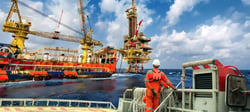Petroleum engineers wear several different hats. They work with teams of other petrochemical engineers and specialists to locate natural gas and oil reserves. Petroleum engineers also develop efficient and cost-effective methods to extract those energy sources, so people can heat their homes and drive their cars, among other things. Petroleum engineers use their specialized geological, mathematics, and petrochemical engineering knowledge to perform these diverse scientific and engineering tasks day in and day out.
In petroleum engineer jobs, the engineers often facilitate the installation and operation of equipment in oil and gas fields, on offshore rigs, or mines. Other responsibilities include determining the economic cost-benefit of extraction and drilling at sites, recommends and guides best practice petrochemical engineering work, and makes forecasts and plans for extraction and drilling.
Petrochemical engineers also must lead maintenance of equipment and collaborate intensively with other engineering and technical staff to execute extraction tasks. For instance, petroleum engineers need to work closely with scientists and geologists to design extraction methods that prevent creating pollution and earthquakes, since the oil or gas is usually located deep within underlying rock formations.
Given the continued importance of petroleum engineering work within the energy sector, there is no shortage of opportunities for petrochemical engineers. Career specializations within petrochemical engineering include drilling engineers, completions engineers, reservoir engineers and production engineers.
Apply now for a job as petroleum engineer!
Servicetechniker Elektrotechnik (w/m/d)
Location: Wuppertal
Branche: Renewable Energy
Expertise: Engineering & Design
Experience: 1 years
Entwicklung und Optimierung von Produktionsprozessen als Verfahrenstechniker. Analyse bestehender Prozesse zur Identifikation von Verbesserungspotenzialen. Zusammenarbeit mit anderen Abteilungen zur Koordination der Produktion. Wartung und Inspektion von Anlagenbauteilen, inklusive Störungsanalyse und Umsetzung von Sicherheitsvorschriften.
Projektmanager Chemie
Location: Salzburg
Branche: Renewable Energy
Expertise: Project Management & Services
Experience: 1 years
Ihre Hauptaufgabe ist die Planung, Abwicklung und Qualifizierung von Projekten im Chemiebereich. Dazu gehört die Koordination der eingesetzten Projektmitarbeiter sowie das Schnittstellenmanagement. Sie erstellen Terminpläne und planen die einzelnen Projektmeilensteine. Mit Ihrem Fachwissen fungieren Sie als zentraler Ansprechpartner sowohl für interne Fachabteilungen als auch für externe Ansprechpartner. Darüber hinaus beraten Sie die Auftraggeber hinsichtlich umwelttechnischer, sicherheitstechnischer und verfahrenstechnischer Belange und erstellen die Angebote. Ihr Kommunikationsgeschick ist bei der Führung von Verhandlungen mit Lieferanten gefragt. Sie erarbeiten das Investitionsbudget, erstellen für Ihre Projekte Schätzungen der Projektkosten und steuern die erforderlichen Fremdleistungen. Zudem überwachen Sie die Fortschritte in den Projekten und leiten gegebenenfalls Optimierungsmaßnahmen ein. Die Dokumentation rundet Ihr Aufgabengebiet ab.
Veiligheidsmanager
Location: Dessel
Branche: Renewable Energy
Expertise: Health, Safety, Environmental & Quality
Experience: 3 years
Als lid van de veiligheidsstudiedienst binnen de dienst Veiligheid, Security en Milieu werk je mee aan de periodieke veiligheidsherzieningen van de nucleaire installaties. Je begeleidt en implementeert verbeteringsacties die voortkomen uit deze herzieningen. De functie omvat het uitwerken en toepassen van veiligheidsrichtlijnen om continue verbetering op veiligheidsvlak te waarborgen. Daarnaast voer je veiligheidsstudies uit, zowel projectmatig als op verzoek van de overheid, om veilige installaties te realiseren. Ook neem je de projectleiding op van veiligheid specifieke projecten, zoals tienjaarlijkse herzieningen en stresstests. Gelukkig kunnen we ook op jou rekenen bij het:Voorbereiden, begeleiden, uitvoeren en verifiëren van veiligheidsstudies en analyses voor nieuwe of gewijzigde installaties.Leiding nemen over veiligheid specifieke projecten om deze succesvol af te ronden.Uitvoeren en begeleiden van studies voor vergunningsdossiers om te voldoen aan veiligheids- en milieueisen.Uitvoeren van berekeningen en modellering ter ondersteuning van andere diensten.
Technischer Zeichner der Verfahrenstechnik
Location: Köln
Branche: Renewable Energy
Expertise: Research & Development
Experience: 2 years
Bestandsaufnahme von Rohrleitungen und Apparaten Erstellung von Handisometrien und deren Digitalisierung Aufnahme und Korrektur bestehender R&I-Fließbilder Zeichnung von R&I-Fließbildern Erstellung von Skizzen für technische Spezifikationen Pflege von Rohrleitungs- und Armaturenlisten
Industrieelektriker für Chemie, Petrochemie und Energiewirtschaft
Location: Köln
Branche: Renewable Energy
Expertise: Operations & Maintenance
Experience: 1 years
In Ihrem neuen Job dreht sich alles rund um das Thema Elektrotechnik. Im Team EMSR Montage sind Sie für die Bereiche Kabelzug, Schaltschrankbau, Messungen, Rückbau von Anlagen verantwortlich. Ebenfalls sind Sie für die Durchführung und Protokollierung von VDE DGUV V3 verantwortlich Die Verdrahtung und Installation von Steckdosen und Fehlerstrom-Schutzschalter (RCD) gehört ebenfalls zu Ihren Aufgaben, wie auch die Installation und Wartung elektrischer Anlagen der Industrie Ihr Tätigkeitsprofil wird durch die Inbetriebnahme und Störungsbeseitigung abgerundet.
Common petroleum engineer responsibilities
A petroleum engineer is responsible for performing a range of important engineering tasks. Responsibilities may include:
- Analyzing geological formations to identify reserves, determine extraction methods and related costs, benefits, and risks;
- Testing and surveying areas to determine extraction possibilities;
- Inspecting, monitoring, testing, detecting, and solving an array of petrochemical engineering challenges, such as determining the most efficient way to access gas under a shale bed;
- Using computer models to determine extraction approaches and equipment needed;
- Guiding and overseeing ongoing extraction operations;
- Installing, inspecting, and maintaining extraction equipment;
- Refining extraction methods as needed;
- Managing the disposal of extraction equipment;
- Planning and deploying functional petrochemical engineering processes according to plan from start to finish;
- Collaborating with diverse engineers and specialist team members, as well as customers on petrochemical engineering projects;
- Supervising and training team members on projects;
- Collecting data or writing reports related to petrochemical engineering projects;
- Preparing detailed documentation and specifications for the purchase of petrochemical engineering equipment and materials;
- Delivering results in line with agreed petroleum engineering project timelines and budgets;
- Ensuring that all petrochemical engineering outputs are following relevant environmental and safety requirements, codes, and certifications.
Qualifications for petroleum engineers
Petroleum engineers should have at least a Bachelor’s degree in Petroleum Engineering, Chemical Engineering, Mechanical Engineering, or a related technical field. An advanced degree is advantageous. In some countries, an engineering license may also be required.
Additional supporting skills and experience include:
- 3-5 years of petroleum engineering experience;
- Solid understanding of petrochemical substances and manufacturing;
- Excellent applied chemistry, math, and analytical skills;
- Proficiency in using diverse computer operating system hardware and software;
- Strong verbal and written communication skills to be able to work easily with other engineers, managers, and team members;
- Project and team management skills;
- Able and willing to travel regularly, and work in harsh conditions, including lifting heavy equipment as needed.




